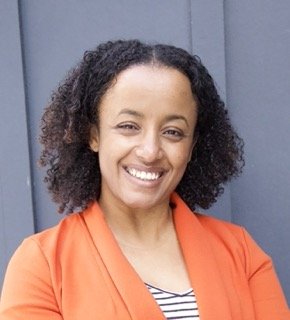Introducing Eleni Refu
2/14/2023
The Trust-Based Philanthropy Project was thrilled to welcome Eleni Refu to our team this year as the new Senior Manager of Knowledge & Resources. Eleni brings a rich set of experiences and wisdom to the role. Get to know her more in the Q & A below.
Can you share about your journey to this role?
My earliest experiences in philanthropy started when I was young. My family came to the United States as refugees, which meant that institutional and philanthropic support played a role in my life from an early age. This experience led me to believe that my calling was to give back and make the world a better place for people like me and my family– that’s probably why my work has circled around nonprofits and philanthropy for my entire career.
My first position after college was as a fundraiser in a direct service organization called Lift Communities in DC, which was my entry into the nonprofit world. That was through an Americorps *VISTA position that led me to join The Ocean Foundation (TOF), an international marine conservation organization. While at TOF, I was promoted to a program evaluation position during a time when they had a real need for a diversity, equity and inclusion lens in the organization. Even though it wasn’t an explicit part of my role at the time, I thought, ‘I can do that.’ So I started a DEI Initiative in the organization and learned a ton about what it takes to actually make change in the mission, vision and culture of an organization. I eventually transitioned from that role to the Senior Engagement Associate role at the National Committee for Responsive Philanthropy (NCRP), which, similar to TBP, advises funders on how to make their philanthropy more equitable and rooted in shifting power through systemic change. NCRP is where I learned significant lessons in how to radically shift power between funders and communities– another skill that is essential in this new role at TBP.
So between my experience in philanthropy, program evaluation, implementing equitable practices, and an in depth understanding of what power-shifting looks like– I felt like this position was designed for me. Needless to say, I was excited about it.
What excites you most about being a part of this movement?
Trust-based philanthropy is a nimble framework that can be applied to any aspect of philanthropy and can provide a blueprint for how philanthropy can respond to the needs of the moment. That’s the direction that all of our field should be moving. Philanthropy has been seen as an elite, cemented institution for so many years, and a trust-based approach reorganizes that by saying: our practices are not static and they need to evolve as the world evolves. The job of funders should be to adapt to the needs of communities, not require communities to adapt to them. I am so glad to be a part of something that is unboxing stale cultures and norms.
What does trust mean to you in the context of this work, and what role does equity play in trust?
Trust is about partnership. It’s about two or more people coming together to co-create the conditions and practices that will enable trust, and then being accountable to them. And you can’t have trust without shared power. I think of the true definition of equity as one where power is equally distributed. Trust is that power sharing in action.
Doing this work as a Black woman has shaped how I understand trust and my role in this movement. Where I used to see it as a barrier for others to build a trusting relationship with me, I come into this work now with my identity at the forefront. The more people I see in the sector with identities that have not traditionally held power or been uplifted as experts in their lived experiences, the more I know that my identity can be a bridge to more people to join and lead our movement.
What can you share about your vision for trust-based philanthropy?
One thing I’ve been thinking about is philanthropy-serving organizations as organic infrastructures that operate as convening spaces for funders that hold a lot of knowledge and resources. How can we utilize them as an established institution in order to advocate for TBP and bring in other funders that we might not reach in these next two years? I’d like to see a movement of funders organizing themselves just like we see folks out in the streets– putting their bodies in harm's way, acting collectively as a community with one voice and one purpose– all to advance the changes they want to see in the world. I would love for trust-based practice to be the training ground for funders to get to that stage where they're figuratively and literally in the streets demanding the changes that they want to make to better align with their missions. That’s where I see the movement going.

